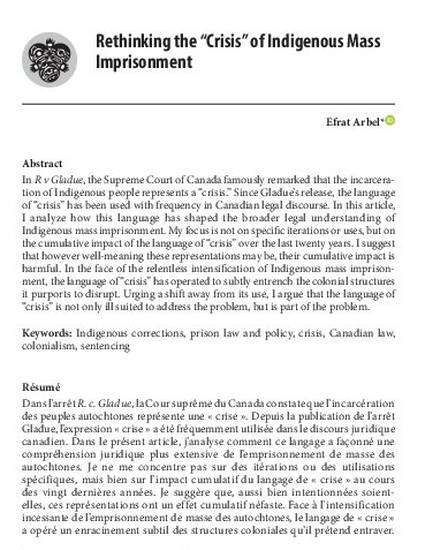
Article
Rethinking the "Crisis" of Indigenous Mass Imprisonment.pdf
Canadian Journal of Law and Society
(2019)
Abstract
In R v Gladue, the Supreme Court of Canada famously remarked that the incarceration of Indigenous people represents a “crisis.” Since Gladue’s release, the language of “crisis” has been used with frequency in Canadian legal discourse. In this article, I analyze how this language has shaped the broader legal understanding of Indigenous mass imprisonment. My focus is not on specific iterations or uses, but on the cumulative impact of the language of “crisis” over the last twenty years. I suggest that however well-meaning these representations may be, their cumulative impact is harmful. In the face of the relentless intensification of Indigenous mass imprisonment, the language of “crisis” has operated to subtly entrench the colonial structures it purports to disrupt. Urging a shift away from its use, I argue that the language of “crisis” is not only ill suited to address the problem, but is part of the problem.
Keywords
- prison,
- prison law and policy; colonialism; law and society; mass incarceration;
Disciplines
Publication Date
December 30, 2019
DOI
https://doi.org/10.1017/cls.2019.37
Publisher Statement
Canadian Journal of Law and Society / Revue Canadienne Droit et Société, 2019. This is an Open Access article, distributed under the terms of the Creative Commons Attribution licence (http://creativecommons.org/licenses/by/4.0/), which permits unrestricted re-use, distribution, and reproduction in any medium, provided the original work is properly cited. Volume 34, no. 3, pp. 437–456. doi:10.1017/cls.2019.37
Citation Information
Efrat Arbel. "Rethinking the "Crisis" of Indigenous Mass Imprisonment.pdf" Canadian Journal of Law and Society Vol. 34 Iss. 3 (2019) p. 437 - 456 Available at: http://works.bepress.com/efrat-arbel/7/
